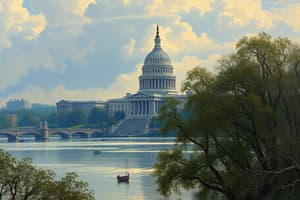Podcast
Questions and Answers
Who was known as 'Old Hickory'?
Who was known as 'Old Hickory'?
- John Calhoun
- Henry Clay
- John Quincy Adams
- Andrew Jackson (correct)
In which state did Andrew Jackson win his fame during the War of 1812?
In which state did Andrew Jackson win his fame during the War of 1812?
- Georgia
- Kentucky
- Louisiana
- Tennessee (correct)
What did the Kansas-Nebraska Act introduce?
What did the Kansas-Nebraska Act introduce?
- Enforcement of the Dred Scott decision
- Abolition of slavery
- Expansion of the Missouri Compromise line
- Popular sovereignty (correct)
Which president disastrously ran on the Free Soil ticket in 1848?
Which president disastrously ran on the Free Soil ticket in 1848?
Who introduced legislation to outlaw slavery in all states acquired from Mexico?
Who introduced legislation to outlaw slavery in all states acquired from Mexico?
What was the role of Henry Clay in resolving the Tariff of Abominations?
What was the role of Henry Clay in resolving the Tariff of Abominations?
Why did Lincoln feel John Brown’s raid on Harper’s Ferry was unhelpful to the abolitionist cause?
Why did Lincoln feel John Brown’s raid on Harper’s Ferry was unhelpful to the abolitionist cause?
What made Lincoln’s speech at the Cooper Institute pivotal for his political career and the nation’s trajectory?
What made Lincoln’s speech at the Cooper Institute pivotal for his political career and the nation’s trajectory?
Make a case for both antislavery and proslavery from Biblical grounds.
Make a case for both antislavery and proslavery from Biblical grounds.
Which two states entered the Union at the Missouri Compromise?
Which two states entered the Union at the Missouri Compromise?
The abolitionist movement, colonization movement, and slavery movement were strongest in which regions of the country?
The abolitionist movement, colonization movement, and slavery movement were strongest in which regions of the country?
Which two states that entered the Union in the 1840s and 50s formerly belonged to Mexico?
Which two states that entered the Union in the 1840s and 50s formerly belonged to Mexico?
What was the objective of the Indian Removal Act passed in 1830?
What was the objective of the Indian Removal Act passed in 1830?
How did Jackson's handling of the Nullification Crisis demonstrate his views on federal power?
How did Jackson's handling of the Nullification Crisis demonstrate his views on federal power?
How did Jacksonian democracy contribute to a more inclusive nation?
How did Jacksonian democracy contribute to a more inclusive nation?
What was a significant consequence of the Indian Removal Act on Native American tribes?
What was a significant consequence of the Indian Removal Act on Native American tribes?
In what way did Jacksonian democracy influence the power dynamics between the federal government and states?
In what way did Jacksonian democracy influence the power dynamics between the federal government and states?
What role did Andrew Jackson play in shaping American democracy during his presidency?
What role did Andrew Jackson play in shaping American democracy during his presidency?
What was a key characteristic of Jacksonian democracy in terms of voting rights?
What was a key characteristic of Jacksonian democracy in terms of voting rights?
Who was the President during the Nullification Crisis of 1832?
Who was the President during the Nullification Crisis of 1832?
Which event led to the Nullification Crisis in 1832?
Which event led to the Nullification Crisis in 1832?
Which President was known for his commitment to democracy and belief in the power of the common voter during the Jacksonian era?
Which President was known for his commitment to democracy and belief in the power of the common voter during the Jacksonian era?
What was one significant effect of Andrew Jackson's presidency on the Democratic Party?
What was one significant effect of Andrew Jackson's presidency on the Democratic Party?
The Indian Removal Act was a controversial policy during Jackson's presidency that primarily aimed to:
The Indian Removal Act was a controversial policy during Jackson's presidency that primarily aimed to:
What was the main purpose of the Fugitive Slave Act of 1850?
What was the main purpose of the Fugitive Slave Act of 1850?
How did the Fugitive Slave Act impact enslaved individuals' ability to prove their freedom?
How did the Fugitive Slave Act impact enslaved individuals' ability to prove their freedom?
What was the Compromise of 1850 intended to do?
What was the Compromise of 1850 intended to do?
Who were major opponents of the Fugitive Slave Act in the North?
Who were major opponents of the Fugitive Slave Act in the North?
What legal requirement did the Fugitive Slave Act impose on citizens, government officials, and businesses?
What legal requirement did the Fugitive Slave Act impose on citizens, government officials, and businesses?
What was one lasting legacy and repercussion of the Fugitive Slave Act of 1850?
What was one lasting legacy and repercussion of the Fugitive Slave Act of 1850?
What role did Harriet Tubman play in relation to the Fugitive Slave Act?
What role did Harriet Tubman play in relation to the Fugitive Slave Act?
How did Northern states react to the Fugitive Slave Act?
How did Northern states react to the Fugitive Slave Act?
What power did the Fugitive Slave Act grant federal commissioners and judges?
What power did the Fugitive Slave Act grant federal commissioners and judges?
How did the Fugitive Slave Act impact the divide between North and South?
How did the Fugitive Slave Act impact the divide between North and South?
What was a significant consequence of the Fugitive Slave Act on enslaved individuals?
What was a significant consequence of the Fugitive Slave Act on enslaved individuals?
What was a key contribution of the Fugitive Slave Act to the abolitionist movement?
What was a key contribution of the Fugitive Slave Act to the abolitionist movement?




